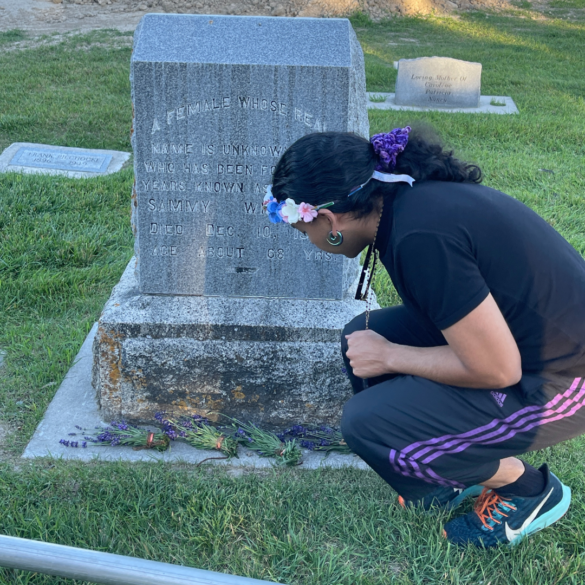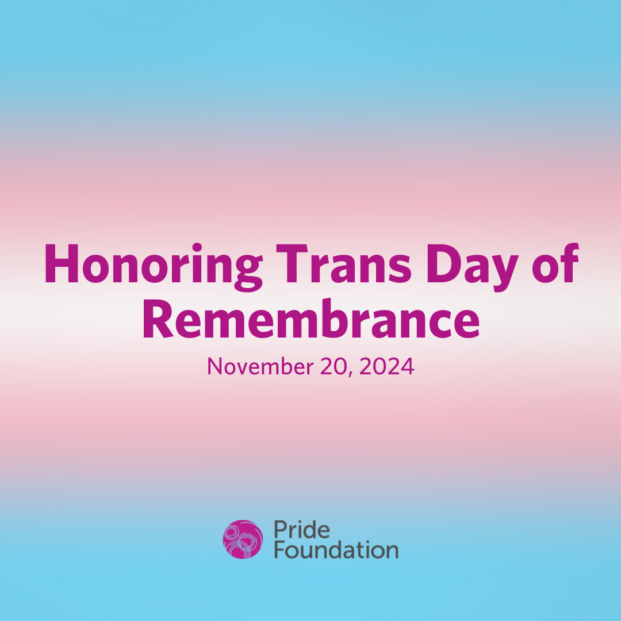While attending our fall retreat in Bozeman, Montana this September, a group of Pride Foundation staff and board ventured to the nearby town of Manhattan to pay respect to one of the earliest recorded Trans+ pioneers in the Northwest: Sammy Williams. At the time of his death in 1908, his gravesite was desecrated due to transphobia and continues to bear the scars of that, but Sammy’s story lives on.

Reflections Upon Visiting the Grave of Sammy Williams
Written by: MoHagani Magnetek, Senior Manager Community Advocacy, Research, and Education
The narrative surrounding Sammy Williams captivated me deeply when I first encountered it. My friend and co-worker, Omni, shared a potent piece of history that revealed a shocking instance of transphobia that unfolded following Sammy’s death. The community, left to cope with the loss, came to realize that Sammy had lived his life as a transgender man. In a profoundly misguided effort at remembrance, they erected a headstone in Meadowview Cemetery that bore the inscription: “A female… known as Sammy Williams.” This wording not only outed Sammy without his consent but also served as a glaring, public testament to transphobia and a stark act of disrespect toward his identity.
Fast forward 116 years from that moment, and we still find ourselves grappling with many of the same issues—struggling to assert the presence and dignity of gender non-conforming individuals in a society that frequently seeks to erase or invalidate their identities. In recognition of this ongoing battle and to honor Sammy’s legacy, we embarked on a meaningful pilgrimage to his gravesite in Manhattan, Montana, which lies about a picturesque forty-five-minute drive from Bozeman. Arriving at his grave, the question weighed heavily on our hearts: who was Sammy Williams, beyond merely being a target of transphobia?
By contemporary definitions, Sammy was undoubtedly a transgender man who passed away on December 10, 1908, in Manhattan, Montana. Esteemed and respected in his community, Sammy was not just known for his identity but also for his kindness and generosity. He was frequently cited as someone who extended his wealth and compassion to those in need, aiding the sick, the impoverished, and the marginalized.
In addition to his charitable nature, Sammy was celebrated for his exceptional culinary skills, fostering a love for cooking that brought people together. His social spirit was equally robust; he enjoyed dancing and engaging in lively conversations, and he actively participated in civic duties, such as voting, during a time when women were systematically disenfranchised. Sammy also spoke multiple languages fluently, including German and Norwegian—a reflection of his rich cultural heritage and broad experiences.
While Sammy’s name first appeared in Montana’s historical records only after the 1880s, stories passed down through oral histories shortly after his passing in 1908 suggest that he spent his formative years with his family in Eau Claire, Wisconsin. This immigrant family arrived in America from Denmark, seeking new opportunities in the 1850s. Sammy was born on March 16, 1833, in Buskerud, Norway, under the name Ingeborg Amundsdatter Amundsli Viko. At just 17 years of age, he and his family made the journey to the United States, arriving at Ellis Island in New York City on July 15, 1850. From there, they traveled onward to Wisconsin, where Sammy began to build his reputation as a skilled cook.
However, there remains a significant gap in documented history regarding Sammy’s life from the 1850s to the late 1800s. This period likely corresponds to when he began to navigate his identity more freely, choosing to live publicly as a man and distancing himself from his immediate family. It is worth mentioning that Sammy was also known for his financial prudence; he made wise investments throughout his life, and by the time of his death, he had acquired 320 acres of land outside of Manhattan, Montana.
Regrettably, the qualities that defined him—his kindness, generosity, culinary talent, and resilience—are often overshadowed by the painful legacy of the gravestone that still stands today.
Through this pilgrimage, we affirm our understanding of the struggle faced by many in their quest for authenticity. We empathize with one another’s efforts to live true to ourselves in a world often plagued by hatred, prejudice, and transphobia. By remembering Sammy, we not only honor his legacy but also assert our commitment to advocating for dignity, acceptance, and respect for all individuals, regardless of their identity.
This offering was sponsored by our TRANSform Culture program as part of our work nourishing narratives of Trans+ existence in the Northwest. If you are interested in helping us honor Sammy with a new tombstone or have a story like Sammy’s to share with us, please email omni@pridefoundation.org and consider donating to our work.
While all of our grantee partners support and serve LGBTQ+ people and communities broadly, we want to elevate a few whose work specifically focuses on trans, non-binary, and gender diverse people and communities. We invite you to learn more about their work:
Black Liberation Collective (Idaho)
Montana Two-Spirit Society (Montana)
Rogue Action Center and Rogue Valley Pepper Shakers (Oregon)
Trans Rural Lives Project (Washington)
Trans Visible Montana (Montana)
UTOPIA Washington (Washington)
Educational resources on trans and gender-diverse innovations:
GLAAD Trans Day of Remembrance Resources
Trans Agenda for Liberation by the Transgender Law Center
Trans Pioneers List by Lynne Conway with the University of Michigan:
